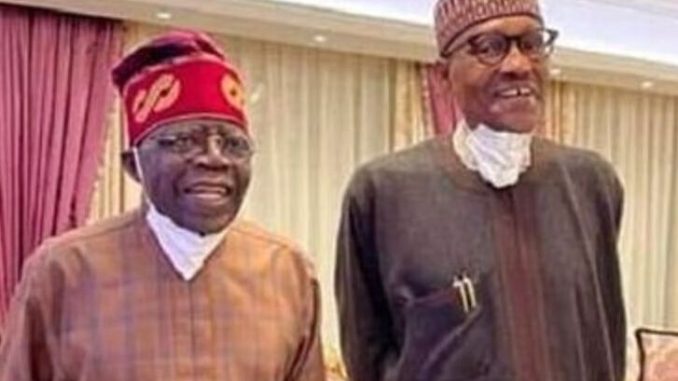
By Obinna Ejianya (9News Nigeria – Melbourne, Australia)
While it would be an overstatement to say Nigerians were in “heaven” during Buhari’s administration, the current economic realities under Tinubu’s government have made many Nigerians look back at the Buhari era with a sense of nostalgia. The sharp depreciation of the Naira, skyrocketing fuel prices, and the overall increase in the cost of living have created unprecedented challenges for many Nigerians.
The transition from Muhammadu Buhari’s administration to Bola Tinubu’s presidency has brought about significant changes (more to the negative than positive) in Nigeria’s economic landscape. Many Nigerians are experiencing untold increased escruciating hardship than they ever imagined. While the Buhari era was not without its severe challenges, a comparison of key economic indicators and living conditions suggests that, sadly, Nigerians may have indeed been better off during Buhari’s tenure than they are now under Tinubu’s administration.
The Presidency may attempt to convince Nigerians that the government’s policies are ultimately for the greater good in the long-run. However, the stark facts and figures paint a different picture, tipping the balance’s pendulum towards the sad reality that Nigerians are indeed no longer smiling.
1. Economic Indicators:
Exchange Rate:
Under Tinubu’s government, the Nigerian currency, Naira has continued to plummet against the US dollar amid ensued economic challenges. Whereas during Buhari’s administration, particularly in 2022, the exchange rate between the US Dollar and Nigerian Naira was relatively stable. According to historical data, the best exchange rate in 2022 was 448.8951 NGN to 1 USD on December 19, 2022, with an average rate of 423.7166 NGN throughout the year. The worst rate was 410.937 NGN on January 9, 2022.
In contrast, under Tinubu’s administration, the Naira has experienced significant depreciation. As of July 2024, the exchange rate has reached unprecedented levels, with 1 USD trading for over 1,500 NGN in the parallel market. This sharp decline in the Naira’s value has had far-reaching consequences on the cost of imported goods and overall inflation.
Fuel Prices:
One of the most notable changes affecting Nigerians’ daily lives has been the steep increase in fuel prices. The removal of fuel subsidies by President Tinubu’s administration in May 2023 has led to sharp increases in fuel prices and cost of living for Nigerians. The fuel price hikes have had severe negative impacts on poor Nigerian citizens, making it difficult for many to afford basic necessities and transportation.
According to the National Bureau of Statistics (NBS), fuel prices increased by a staggering 215.95% in just one year. This dramatic rise can be largely attributed to the removal of fuel subsidies, a policy implemented by the Tinubu administration.
During Buhari’s tenure, fuel prices were relatively stable due to the subsidy regime. However, the current situation has led to a significant increase in transportation costs and, by extension, the prices of goods and services across the board.
Food Prices:
The cost of essential food items has seen a sharp increase under Tinubu’s administration. According to Statista, the prices of staple foods such as rice, beans, and vegetable oil have risen significantly. For instance, the average price of 1kg of rice increased from 537.4 NGN in March 2023 to 726.99 NGN in March 2024, a 35.3% increase in just one year.
Nigerian Domestic & Foreign Debt In Review:
Under President Tinubu, Nigeria’s debt profile shows a worrying trend of rapid increase, particularly in domestic debt. The significant growth in total debt, combined with currency depreciation, presents a challenging economic scenario that requires careful management and strategic planning to ensure long-term fiscal sustainability.
As of March 2024 Nigeria’s total public debt has sharply increased by ₦24.33 trillion, from ₦97.34 trillion ($108.23 billion) in December 2023 to ₦121.67 trillion ($91.46 billion).
It was gathered that the increase was primarily driven by government’s new borrowing to partially finance the 2024 budget deficit, as well as the securitization of a portion of the ₦7.3 trillion advances at the Central Bank of Nigeria by Ways and Means.
In terms of Domestic Debts, it has increased from ₦59.12 trillion to ₦65.65 trillion, while the total external debt increased from ₦56.02 trillion. According to data from National Bureau of Statistics, Nigeria External debt stood at N18. 70 trillion (US$41.69 billion) in Q4 2022, while domestic debt was N27. 55 trillion (US$61.41billion).
Nigerian Domestic & Foreign Debt Q1 2024
According to Executive Summary by Nigeria Bureau of Statistics, Nigerian Domestic & Foreign Debt in the first Quarter of 2024 stands at 67 trillion (US$91.46 billion) from N97. 34 trillion (US$ 108.23 billion) in the last Quarter of 2023. This is an indication of a growth rate of the debts by 24.99% on a quarter-on-quarter basis. The total external debt stood at N56. 02 trillion (US$42.12 billion) in the first Quarter of 2024 as well, while total domestic debt was N65 trillion.
President Bola Tinubu has expressed concerns over the country’s inability to service its debt, which consumes around 90% of government revenue, stating that this is an unsustainable path.
2. Living Conditions and Public Perception:
The deteriorating economic situation has led to widespread discontent among Nigerians. Various religious and civil society groups have voiced their concerns about the increasing hardship faced by citizens:
a. The Supreme Council for Shari’ah in Nigeria stated that Nigerians’ suffering has increased under Tinubu’s administration, citing the rising cost of living and economic challenges.
b. The Christian Association of Nigeria (CAN) has called on President Tinubu and state governors to take action, stating, “Do something, Nigerians are suffering.”
c. Amnesty International has described the current situation as “one of the worst post-independence economic crises” in Nigeria’s history.
d. The Catholic Bishops’ Conference of Nigeria has gone as far as saying that Nigeria is experiencing its “worst moments” under Tinubu’s leadership.
These statements reflect a growing consensus that the economic situation has worsened significantly since Tinubu took office.
3. Government Reforms and Their Impact:
President Tinubu’s administration has implemented several reforms aimed at improving Nigeria’s economy in the long term. These include:
a. Removal of fuel subsidies which was done without any level of transparency owing to the fact that the government is still paying for subsidies through backdoors thereby leaving more rooms for embezzlement and siphon of public funds. b. Unification of exchange rates that resulted in the free fall of the Naira against foreign exchanges. c. Botched Efforts to attract foreign investment
While these policies may have long-term benefits, their immediate impact has been a sharp increase in the cost of living for most Nigerians. The removal of fuel subsidies, in particular, has had a cascading effect on transportation costs and, consequently, the prices of goods and services.
4. Public Response and Calls for Action:
As the economic situation worsens, there have been increasing calls for the government to take action:
a. Citizens have urged President Tinubu to cut the cost of governance, arguing that Nigerians are suffering while government expenditure remains high.
b. There are demands for immediate measures to alleviate the suffering of Nigerians, particularly in terms of food security and job creation.
c. Many Nigerians are calling for a review of some of the implemented policies, especially those that have led to increased hardship for the average citizen.
Call for President Tinubu’s Immediate Action:
President Tinubu’s government has clarified that these economic policies are purported for long-term goals that may not immediately translate to improved living conditions. However, the stark contrast between the relative stability of the Buhari era and the current economic turmoil under Tinubu has led many to question the effectiveness of the new administration’s policies. Are Nigerians going to be roasted in hardship before the policies come to positive fruition, or for how long can they last before things turn around for good?
The dire economic situation in Nigeria demands immediate and decisive action from President Tinubu to alleviate the suffering of the country’s poor. As Nigeria moves forward, it is crucial for the government to find a balance between necessary economic reforms and the immediate needs of its citizens. The coming months will be critical in determining whether the Tinubu administration can turn the tide and deliver on its promises of economic growth and improved living conditions for all Nigerians. The recent removal of fuel subsidies has exacerbated existing hardships, making it imperative to implement bold measures that can provide rapid relief while laying the groundwork for sustainable economic growth.
On the part of the citizens:
Nigerians’ “Suffering and Smiling” syndrome has inconceivably gone beyond normalcy to a perplexing magnitude that defies logical comprehension. This resilience, once admired, now threatens to become counterproductive.
It’s time for Nigerians to reconsider this habit of tolerating extreme difficulties with a cheerful facade. Instead, citizens should channel their energy into holding government officials accountable for their actions and decisions. By demanding responsibility and transparency from those in power, Nigerians can drive meaningful changes that address the root causes of their hardships.
This shift from passive acceptance to active engagement is crucial for steering the country towards positive development and improved living conditions. It’s not about losing optimism, but rather about directing that strength towards constructive action and advocacy for better governance.
By Obinna Ejianya (9News Nigeria – Melbourne, Australia)

